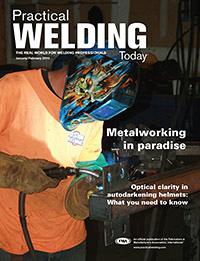- FMA
- The Fabricator
- FABTECH
- Canadian Metalworking
Categories
- Additive Manufacturing
- Aluminum Welding
- Arc Welding
- Assembly and Joining
- Automation and Robotics
- Bending and Forming
- Consumables
- Cutting and Weld Prep
- Electric Vehicles
- En Español
- Finishing
- Hydroforming
- Laser Cutting
- Laser Welding
- Machining
- Manufacturing Software
- Materials Handling
- Metals/Materials
- Oxyfuel Cutting
- Plasma Cutting
- Power Tools
- Punching and Other Holemaking
- Roll Forming
- Safety
- Sawing
- Shearing
- Shop Management
- Testing and Measuring
- Tube and Pipe Fabrication
- Tube and Pipe Production
- Waterjet Cutting
Industry Directory
Webcasts
Podcasts
FAB 40
Advertise
Subscribe
Account Login
Search
Fabrication minus the relaxation
- By Amanda Carlson
- January 15, 2015
- Article
- Arc Welding
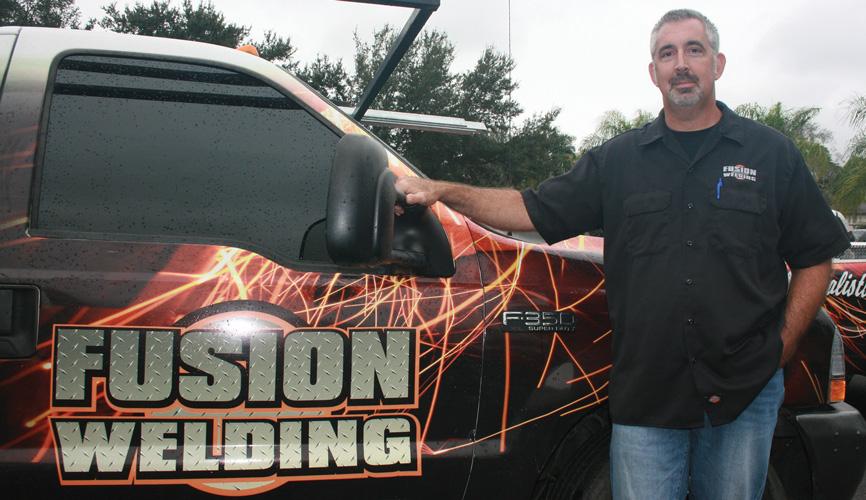
Darin Beaner, vice president of operations at Fusion Metalworks, has been instrumental in building a complete job shop in a traditionally nonindustrial part of the country impressively fast.
It takes courage to start your own business. Some would use a different word to describe picking up and moving your family to a new time zone and starting a business during the recession in an area with an unemployment rate in the high teens. Is it crazy? Reckless? Genius?
The answer depends on how things play out, of course, but so far for Darin and Lisa Beaner of Fusion Metalworks, Fort Myers, Fla., their decisions based on economic climate, intuition, and desire have all seemed to fall under the category of brilliant.
A bit of a stretch? Sure, maybe. But when a company has experienced 100+ percent growth every year of its existence, it’s either due to sheer luck, brilliance, or both.
Flying South … Forever
Anyone who has owned their own business during the last decade knows how difficult the recession was and bears scars that remain today. Businesses that relied on one specialty or only a handful of customers suffered the most and in many cases shut down altogether. Beaner had no intention of letting that happen to him.
An experienced business owner, Beaner had the foresight to sell his Indianapolis race car chassis fabrication company in 2007 before the economy got really bad. He saw an opportunity to create a business fabricating dog boxes—metal crates used to transport hunting dogs in pickup truck beds—but that proved to be a difficult niche to break into, so he sold that too.
After careful consideration, Beaner and his family relocated to Cape Coral, Fla., to escape the cold and be closer to Lisa’s family. What they found wasn’t exactly paradise.
“When I first got down here I thought, ‘Oh, what a mess.’ The unemployment rate was extremely high and growth was stagnant. A testament to that were the garage sales around town—they were selling everything from light switches to fixtures because foreclosures were so high.”
It was a tough time to open a business, but they did—Fusion Welding. It was just the two of them and a truck. Beaner hit the pavement doing whatever he could, such as small fabrication projects, repair work, and even some custom work for those who seemed unphased by the economic downturn.
It didn’t take long for Beaner to realize that there was a real need for a good welding and metal fabricating job shop in the area, nor did it take long for others to realize it too.
“We’re averaging about 136 percent growth a year. We did just about $1.5 million in business in 2013, and we’re on track for about $3.8 for 2014. We’re projecting about 100 percent growth for 2015.
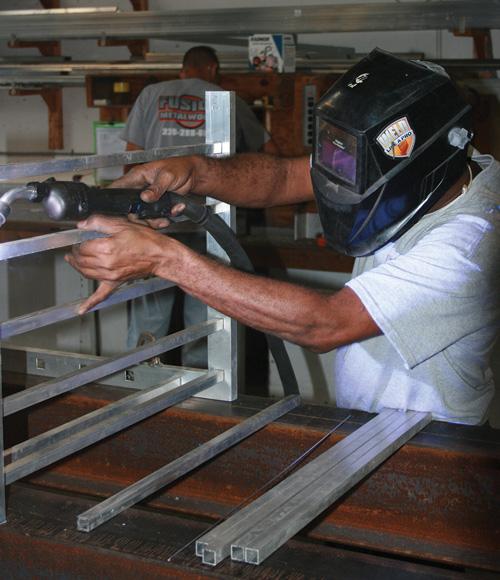
A few years ago Beaner needed workers who could do it all—weld, fabricate, and work in the field. Now he can match someone’s strengths to a particular department, be it structural, aluminum, rigging, or field work. It’s important to Beaner to put people in situations where they can succeed.
“That’s been our biggest challenge—finding ways to keep up with growth.”
How they got there is an interesting story.
Growth Step 1: Invest, Invest, Invest
When a company grows as quickly as Fusion Metalworks did, it often ends up becoming overwhelmed, overextending itself, or sacrificing on quality.
Some businesses choose a niche to help temper growth, but not Beaner. He saw a need for a welding and fabricating job shop that could accommodate any job that came through the door, large or small.
“I think a true job shop is able to handle anything that comes through the door. That’s what sets us apart.”
To truly do it all required a heavy investment … in everything. Beaner moved the company from its original 900-sq.-ft. space to a 12,000-sq.-ft. facility, a space that is still too small for his operation. He purchased more service trucks and hired more guys (more on that later).
It also meant bringing as much as possible in-house to ensure the company had complete control of a job. Outsourcing work meant relinquishing control and possibly missing deadlines or sacrificing quality. Possessing the ability to be a one-stop shop would further solidify his business as one to be reckoned with in the southwest. So gradually Beaner added a CAD and 3-D modeling department. He added a coatings department with a wet coating booth and two powder coating ovens.
In almost five years the company has evolved from a small welding repair and fabrication shop to a full-service metal fabrication center, hence the new name, Fusion Metalworks. It still accepts small repair jobs, but much of the focus is on structural steel, interior and exterior ornamental work, and aluminum. If one division of the company is slow, the other areas, so far, have compensated for that. The powder coating division, for example, employs four people who average 70 hours a week at work and are continuously busy.
“If one side of the company is a little slower, then the other sides are carrying it.”
Growth Step 2: It’s About the People
To be a complete job shop also requires a skilled workforce, a challenge early on for Beaner and something he continues to struggle with to this day. In the company’s early years it needed a jack-of-all trades proficient in multiple welding processes and who was an equally skilled fabricator. That person had to be adept both in the shop and in the field. He needed to be able to carry himself professionally when dealing with customers. Essentially, he needed to be able to do it all.
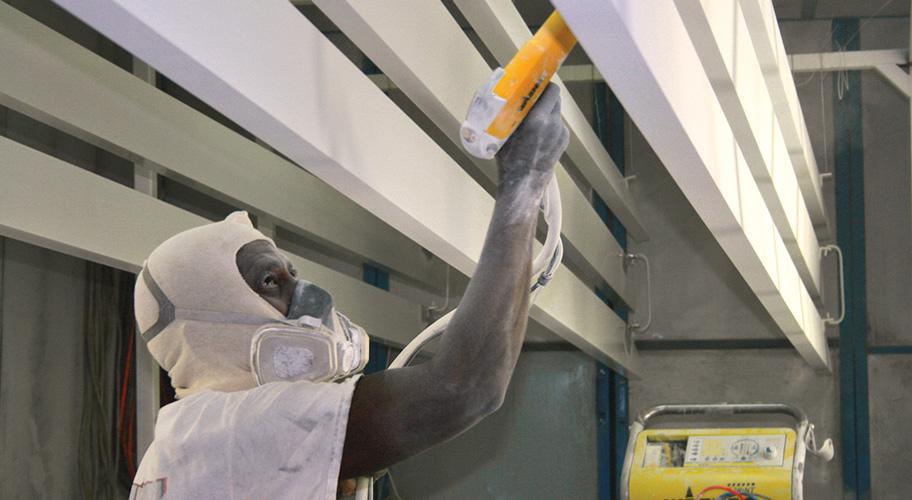
With the addition of a powder coating line and a CAD and 3-D modeling department, Fusion Metalworks is now a full-service job shop with complete control of what goes out the door.
“We’ve never been a bench welding company. We’re not making the same weld over and over again. Sure, we’ve got projects where that might happen, but for the most part we need people with versatility within their discipline.”
Finding those guys was a struggle. Beaner wasn’t pleased with the area talent and instead worked with a head hunter to draw qualified workers from up north. That led to problems of its own of the rather obvious nature. Southwest Florida is a well-known tourism destination, with year-round tropical climate, white sand beaches, lush golf courses, and entertaining night life. It’s a vacationer’s dream, and sometimes an employer’s nightmare.
“The work mentality is a little different down here, and I think it’s easy for people to get caught up in vacation mode and they don’t come out of it. It’s very difficult to find good people and get them in place.”
It’s been a process of trial and error. Many of the transplanted welders have worked out wonderfully. But Beaner also has had to fire some very talented people because they couldn’t seem to ignore their surroundings enough to commit to the work.
“We just had a guy who probably didn’t make it here for two weeks. He had moved down here from Cincinnati and he was really looking for … I don’t know, the sun was shining and I think he just preferred not to be here in the shop. We were quick to spot that out.”
With its growth, Fusion has evolved to the point where it can be a little more deliberate in whom it hires. And with structural, ornamental, aluminum, field repair, CAD, and powder coating all under one roof, it can match a person’s strengths with a particular division’s needs. Beaner said this is important in developing a workforce that views what they do as a career, not a job, and works with pride and holds themselves to a standard of quality that is expected.
“That’s been key. Now we have more areas to move people around to find what fits them. You know, someone might not be great in the shop, but they might be great in the field. Two years ago we needed people who could work in the shop, in the field, and if they couldn’t do both, we might not have kept them,” Beaner explained.
“Just yesterday we had a conversation with our management team about the guys we’re bringing in. If they’re here to just collect a paycheck but are not bringing value to the company and holding themselves accountable, then we need to be a lot faster at cutting them off.”
No Niche? No Problem
Almost five years later the company employs more than 40 people and is able to truly say it is a “no-niche” company. It has completely outgrown its current 12,000-sq.-ft. space and recently leased the building next door, giving it another 12,000 sq. ft. Of course, that’s only a temporary fix. Plans are already in place to purchase land and build an 80,000- to 100,000-sq.-ft. facility.
Now one of the largest job shops in southwest Florida, Fusion Metalworks is pursuing high-profile jobs both within and out of the state. Currently it is in the second phase of restoring Hammond Stadium, home of the Fort Myers Miracle and spring training home of the Minnesota Twins. Fusion crews have been busy fabricating and installing decorative trellises and all of the handrails throughout the park.
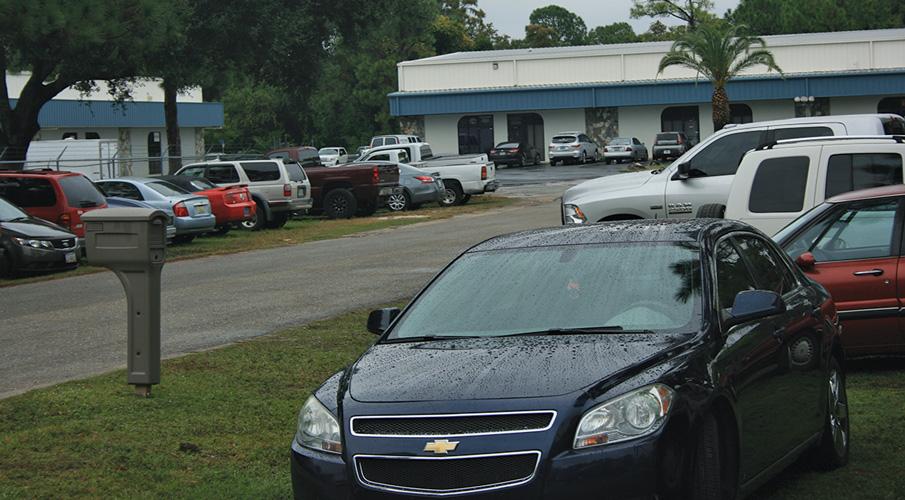
Space is at a premium at the Fort Myers, Fla., facility. Cars lining the street belong almost exclusively to Fusion employees. The company purchased the building next door, giving it 12,000 sq. ft. more to work with.
Their success on this project has led to the confidence to bid on another spring training stadium in Lakeland, Fla., and they are in the process of preparing a bid for all of the handrail work for the new Atlanta Braves stadium in Georgia’s Cobb County.
Even through all of the success and the drive to achieve more, Beaner hasn’t lost perspective on why his business has been a success so far.
“We’ve honored our quotes, honored our commitments, and completed the jobs. We haven’t made money on every job, but we’ve continued the course. That goes a long way because a lot of construction companies here were used to people not always fulfilling their obligation. We’ve taken some hard hits, but we’ve always fulfilled our obligations.
“It’s not just the quality of the work that we do, it’s that we’ve been able to stay the course.”
About the Author

Amanda Carlson
2135 Point Blvd
Elgin, IL 60123
815-227-8260
Amanda Carlson was named as the editor for The WELDER in January 2017. She is responsible for coordinating and writing or editing all of the magazine’s editorial content. Before joining The WELDER, Amanda was a news editor for two years, coordinating and editing all product and industry news items for several publications and thefabricator.com.
About the Publication
subscribe now
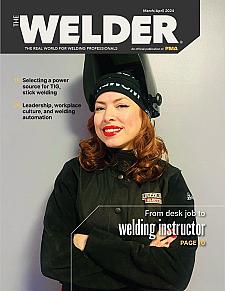
The Welder, formerly known as Practical Welding Today, is a showcase of the real people who make the products we use and work with every day. This magazine has served the welding community in North America well for more than 20 years.
start your free subscription- Stay connected from anywhere

Easily access valuable industry resources now with full access to the digital edition of The Fabricator.

Easily access valuable industry resources now with full access to the digital edition of The Welder.

Easily access valuable industry resources now with full access to the digital edition of The Tube and Pipe Journal.
- Podcasting
- Podcast:
- The Fabricator Podcast
- Published:
- 04/16/2024
- Running Time:
- 63:29
In this episode of The Fabricator Podcast, Caleb Chamberlain, co-founder and CEO of OSH Cut, discusses his company’s...
- Trending Articles
Sheffield Forgemasters makes global leap in welding technology
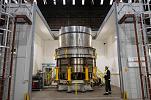
Welding student from Utah to represent the U.S. at WorldSkills 2024

Lincoln Electric announces executive appointments

Engine-driven welding machines include integrated air compressors

ESAB unveils Texas facility renovation
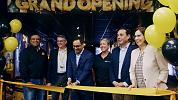
- Industry Events
16th Annual Safety Conference
- April 30 - May 1, 2024
- Elgin,
Pipe and Tube Conference
- May 21 - 22, 2024
- Omaha, NE
World-Class Roll Forming Workshop
- June 5 - 6, 2024
- Louisville, KY
Advanced Laser Application Workshop
- June 25 - 27, 2024
- Novi, MI

























